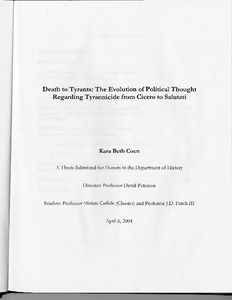| dc.rights.license | In Copyright | en_US |
| dc.creator | Coen, Kara Beth | |
| dc.date.accessioned | 2023-10-20T15:49:27Z | |
| dc.date.available | 2023-10-20T15:49:27Z | |
| dc.date.created | 2004 | |
| dc.identifier | WLURG038_Coen_thesis_2004 | |
| dc.identifier.uri | https://dspace.wlu.edu/handle/11021/36268 | |
| dc.description.abstract | I will devote the first chapter of this work to Marcus Tullius Cicero. Specifically, I will analyze Cicero's definition of the tyrant, as well as his justification of tyrannicide, notably in his De Officiis (44 B.C.). I will then examine the Ciceronian influence evident in the political text Policraticus, written by John of Salisbury (1120-1180). Though John was an English ecclesiastical secretary, his work is integral to our discussion regarding tyrannicide in medieval political theory. . . . I will then study Bartolus of Sassoferrato (1314-1357), a jurist of the Trecento, whose tract, De Tyrannia, examined the subject of Italian tyranny from a purely legal perspective. His discussion inevitably recognizes the issues of the individual tyrant and tyrannicide while addressing the institution of tyranny. Bartolus, a student of the law, lived during the period when the popoio had begun to gain power within Italian city-states, prompting a hatred of tyrannical government. . . . Finally, I will consider Coluccio Salutati (1331-1406), a humanist Florentine chancellor, and evaluate the Ciceronian influence on his political thought regarding tyrannicide. Not only is Cicero discussed frequently in Salutati's De Tyranno, a letter discussing the problem of the tyrant. Salutati directly refuted Cicero's belief that Caesar was a tyrant, and also John of Salisbury's idea that certain forms of tyrannicide are morally legitimate. Salutati's extensive criticism of Cicero, as well as his ardent defense of Julius Caesar, reveals that though humanists relied on classical precedents, they did not accept everything that Roman republican figures had to offer when it conflicted with their own personal agenda. Instead, Salutati's critique of Cicero, as well as his endorsement of a monarchic government, reveals a distinct shift from a pro-republican ideology to a promonarchal ideology. [From Introduction] | en_US |
| dc.format.extent | 77 pages | en_US |
| dc.language.iso | en_US | en_US |
| dc.rights | This material is made available for use in research, teaching, and private study, pursuant to U.S. Copyright law. The user assumes full responsibility for any use of the materials, including but not limited to, infringement of copyright and publication rights of reproduced materials. Any materials used should be fully credited with the source. | en_US |
| dc.rights.uri | http://rightsstatements.org/vocab/InC/1.0/ | en_US |
| dc.subject.other | Washington and Lee University -- Honors in History | en_US |
| dc.title | Death to Tyrants: The Evolution of Political Thought Regarding Tyrannicide from Cicero to Salutati | en_US |
| dc.type | Text | en_US |
| dcterms.isPartOf | WLURG038 - Student Papers | en_US |
| dc.rights.holder | Coen, Kara Beth | en_US |
| dc.subject.fast | Ethics | en_US |
| dc.subject.fast | Despotism | en_US |
| dc.subject.fast | Tyrannicide | en_US |
| dc.subject.fast | De officiis (Cicero, Marcus Tullius) | en_US |
| dc.subject.fast | Policraticus (John, of Salisbury, Bishop of Chartres) | en_US |
| dc.subject.fast | Bartolo, of Sassoferrato, 1313-1357 | en_US |
| dc.subject.fast | Salutati, Coluccio, 1331-1406 | en_US |
| local.department | History | en_US |
